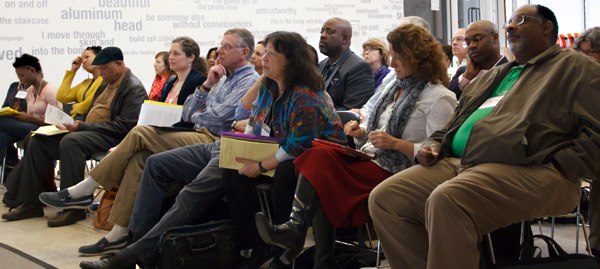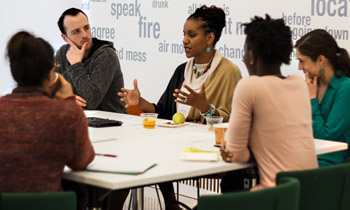 A seed—call it science-and-social-justice—has been germinating in the mind of Regina Stevens-Truss since December of 2009. In truth, Stevens-Truss (the Kurt D. Kaufman Associate Professor of Chemistry) has been thinking on that matter long before then. But the occasion of that December seven years ago—a faculty workshop sponsored by the Arcus Center for Social Justice Leadership (ACSJL) on the topic of incorporating social justice into the undergraduate curriculum—and a conversation at the event with Harvard University professor Jonathan Beckwith (well known for uniting social justice and science in his science courses) gave Stevens-Truss a language for her thinking.
A seed—call it science-and-social-justice—has been germinating in the mind of Regina Stevens-Truss since December of 2009. In truth, Stevens-Truss (the Kurt D. Kaufman Associate Professor of Chemistry) has been thinking on that matter long before then. But the occasion of that December seven years ago—a faculty workshop sponsored by the Arcus Center for Social Justice Leadership (ACSJL) on the topic of incorporating social justice into the undergraduate curriculum—and a conversation at the event with Harvard University professor Jonathan Beckwith (well known for uniting social justice and science in his science courses) gave Stevens-Truss a language for her thinking.
That small seed has come to fruition in several ways over the years, most recently (in a very big way) with the April 2016 Science and Social Justice Think Tank (SSJTT), which gathered from across the country some 60 experts and advocates for social justice consideration in the conduct of research and science education.
The SSJTT, like so many previous fruitions, was sponsored by the ACSJL. “It is so vital to have the social justice center here,” says Stevens-Truss. On the issue of science and social justice, as with so many others, the center provides “a language, a name, if you will, a platform for what needs to be done, and the national reach to do it,” says Stevens-Truss. Language, platform, reach. “The social justice center is indispensable.”
According to Stevens-Truss, in recent years scientists and science educators have improved in the area of science and ethics. Both groups have become better at considering and carefully answering questions like: am I doing research (or teaching research protocols) in a way that respects the human rights of research subjects as well as the integrity of the scientific process? Comparatively, science has been less effective in its consideration of social justice matters.
“We must become better at framing and answering social justice questions,” says Steven-Truss. Is the research we are considering good for society? Who will benefit? Will different communities benefit disproportionately? Will there be adverse burdens to bear and, if so, who or what communities are most likely to bear those burdens?
 A similar battery of social justice questions for science educators certainly includes this one: What course content is required to ensure that students from various backgrounds see themselves as stakeholders in science to a degree that is sufficient to keep them involved in the discipline?
A similar battery of social justice questions for science educators certainly includes this one: What course content is required to ensure that students from various backgrounds see themselves as stakeholders in science to a degree that is sufficient to keep them involved in the discipline?
That last question inspired at least one living ancestor of April’s SSJTT. In 2011 Stevens-Truss, Beckwith and Lisa Brock, academic director of ACSJL and associate professor of history, began collecting the syllabi of science courses that integrate social justice. Two K undergraduate students and a Harvard graduate student searched colleges and universities across the country and compiled the various ways science professors fit social justice into the academic content of their courses. The trio made these ideas available as a resource to all on science and social justice website, part of ACSJL’s Praxis project.
Work on the SSJTT soon followed. Eliza Jane Reilly, deputy executive director of the National Center for Science and Civic Engagement; Karen Winkfield, radiation oncologist at the Massachusetts General Hospital Cancer Center, and Anne Dueweke, director of faculty grants and institutional research at K, joined Stevens-Truss, Beckwith and Brock to form a planning committee. Senior Shannon Haupt, an environmental activist and anthropology and sociology major, served as project assistant.
“We wanted to gather professors, scholars, scientists, public health and environmental leaders working where science and social justice intersect,” says Brock. “We also sought experts on diversity in the STEM fields and people thinking about changes underway in society and science.”
SSJTT participants engaged with three questions: What benefits will accrue when social justice is included in undergraduate, graduate and medical school science courses? What are specific strategies for integrating social justice issues into scientific research? What disciplinary and institution reforms will most effectively advance social-justice-in-science nationally?
“We need to train the next generation in a way that these questions are second nature,” says Stevens-Truss. Particularly gratifying for her was the liberal arts diversity of the SSJTT’s presenters and participants. Attendees included researchers, science professors, policy makers, lawyers, journalists, writers and philanthropists.
“Our evening keynote speakers were a writer [and English professor Debra Marquart, “Owning Our Future: A Poet’s Response to Extraction”] and a visual artist [Mary Beth Heffernan, “Ebola, Culture and Social Justice Through the Lens of a Photographer”],” says Stevens-Truss.
Such diversity matters a great deal, she added, because social justice connects to art, poetry, the social sciences and the hard sciences, a fact with “deep implications for how we teach and practice science.” The committee is currently tackling how to extend the SSJTT’s momentum. The Praxis Center will help. And the language, platform and reach of the ACSJL will be critical.
Stevens-Truss has long been an activist, albeit (perhaps) without the sobriquet. Her work on campus with Sukuma, locally with Sisters in Science, and nationally in a program that connects practicing scientists and middle school teachers comprise distinct expressions of her preoccupation with matters of social justice and science. And now, through the Praxis Center and programs like the SSJTT, the cause and (yes!) its activists have a growing magnitude and unity.
“As scientists and educators we must help each other see our impact on people,” says Stevens-Truss, “and on communities. Especially the marginalized people and communities who often are the most adversely affected by our choices in boardrooms, laboratories, classrooms and scientific funding committees.”
 Kalamazoo College announced today that Writer in Residence and Assistant Professor of English Diane Seuss ’78 will receive the 2017 Florence J. Lucasse Fellowship for Excellence in Scholarship. It is the highest award bestowed by the Kalamazoo College faculty, and it honors the recipient’s contributions in creative work, research and publication. Seuss is the 28th person in the College’s history to receive the award.
Kalamazoo College announced today that Writer in Residence and Assistant Professor of English Diane Seuss ’78 will receive the 2017 Florence J. Lucasse Fellowship for Excellence in Scholarship. It is the highest award bestowed by the Kalamazoo College faculty, and it honors the recipient’s contributions in creative work, research and publication. Seuss is the 28th person in the College’s history to receive the award.
 Scientific inquiry takes no summer break at Kalamazoo College, and a culmination of the summer’s work occurred at the Dow Science Center Mini Poster Session (August 26). In the chemistry department alone some 17 students worked in the laboratories of five chemistry faculty–Professors Bartz, Furge, Smith, Stevens-Truss and Williams. Those students include first-years, sophomores, juniors and seniors, many of the latter working on their Senior Individualized Projects. The mini poster session included 12 presenters explaining the science they had conducted during the summer. Quinton Colwell ’17 (in the red tie) is pictured discussing his poster, titled “Molecular Dynamics and Real-Life Drug Metabolism.” Molecular dynamics is the study of real life systems using computer models and simulations. Colwell’s work involved a relatively novel technique,biased molecular dynamics, which, he wrote, “brings an additional layer to computer simulations relevant to bench-top experiments. It has the potential to be a game-changer.” In addition to Colwell, other presenters included Sarah Glass ’17, Myles Truss ’17, Shreya Bahl ’17, Suma Alzouhayli ’17, and Blake Beauchamp ’17.
Scientific inquiry takes no summer break at Kalamazoo College, and a culmination of the summer’s work occurred at the Dow Science Center Mini Poster Session (August 26). In the chemistry department alone some 17 students worked in the laboratories of five chemistry faculty–Professors Bartz, Furge, Smith, Stevens-Truss and Williams. Those students include first-years, sophomores, juniors and seniors, many of the latter working on their Senior Individualized Projects. The mini poster session included 12 presenters explaining the science they had conducted during the summer. Quinton Colwell ’17 (in the red tie) is pictured discussing his poster, titled “Molecular Dynamics and Real-Life Drug Metabolism.” Molecular dynamics is the study of real life systems using computer models and simulations. Colwell’s work involved a relatively novel technique,biased molecular dynamics, which, he wrote, “brings an additional layer to computer simulations relevant to bench-top experiments. It has the potential to be a game-changer.” In addition to Colwell, other presenters included Sarah Glass ’17, Myles Truss ’17, Shreya Bahl ’17, Suma Alzouhayli ’17, and Blake Beauchamp ’17. Kalamazoo College once again is included in the annual “Fiske Guide to Colleges,” a popular and useful resource for high school students and their families researching prospective colleges, compiled by former New York Times education editor Edward B. Fiske, a top independent voice in college admissions.
Kalamazoo College once again is included in the annual “Fiske Guide to Colleges,” a popular and useful resource for high school students and their families researching prospective colleges, compiled by former New York Times education editor Edward B. Fiske, a top independent voice in college admissions.

 Professor of Psychology Siu-Lan Tan convened and co-chaired a symposium titled “Film, Television, and Music: Embodiment, Neurophysiology, Perception, and Cognition” on July 6, at the 14th International Conference for Music Cognition and Perception held at the Hyatt Regency in San Francisco. This conference gathers more than 550 music cognition researchers from around the world.
Professor of Psychology Siu-Lan Tan convened and co-chaired a symposium titled “Film, Television, and Music: Embodiment, Neurophysiology, Perception, and Cognition” on July 6, at the 14th International Conference for Music Cognition and Perception held at the Hyatt Regency in San Francisco. This conference gathers more than 550 music cognition researchers from around the world.




